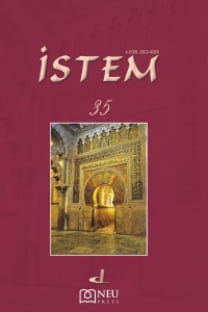ENDÜLÜS ADININ KÖKENİ ÜZERİNE
Endülüs, Vandalucia, Atlantis, Endeliş, Landahlauts
On the Etymology of Word “Andalusia”
Andalusia, Vandalucia, Atlantis, Andalish, Landahlauts,
___
- Kaynaklar Kaynaklar Kaynaklar::::
- » Atçeken, İsmail Hakkı, Endülüs’ün Fethi ve Mûsâ b. Nusayr, Ankara 2002.
- » Bekrî, Abdullah b. Abdülaziz b. Muhammed (ö.487/1094), el-Mesâlik ve’l-Memâlik, thk. Cemal Talebe, Beyrut 2003.
- » Bossong, Georg, “Der Name Al-Andalus Neue Überlegungen Zu Einem Alten Problem”, Trends in Linguistics, Sounds and Systems: Studies in Structure and Change, ed. David Restle & Dietmar Zaefferer, Berlin 2002 s. 149-164.
- » Crow, John A., Spain: The Root and the Flower: A History of the Civilization of Spain and of the Spanish People, New York: Harper & Row, 1963.
- » Doğuştan Günümüze Büyük İslâm Tarihi, rdk: Hakkı Dursun Yıldız, İstanbul, 1989.
- » Gayangos, Pascual De, History of Mohammedan Dynasties In Spain, Londra, 1850.
- » Glick, Thomas F., Islamic and Christian Spain in The Early Middle Ages, Leiden 2005.
- » Halm, Von Heinz, “Al-Andalus und Gothica Sors”, Der Islam, sayı:66 yıl:1989, s.252-263.
- » Halm,Von Heinz, The Empire of The Mahdi: The Rise of Fatimids, İngilizceye çev. Michael Banner, Leiden 1996. ————
- Von Heinz Halm, The Empire of The Mahdi, s. 280
- Georg Bossong, “Der Name Al-Andalus Neue Überlegungen Zu Einem Alten Problem”, Trends in 26
- Linguistics, Sounds and Systems: Studies in Structure and Change, ed. David Restle& Dietmar
- Zaefferer, Berlin 2002, s. 149-164.
- » Hamevî, Yakut (ö.626/1229), Mu’cemu’l-Buldân, thk: Ferid Abdülaziz el-Cündî, Beyrut 1990.
- » Himyerî, Muhammed Abdülmün’im (ö.749/1348), er-Ravdu’l-Mi’târ fi Haberi’l-Aktâr,thk: İhsan Abbas, Beyrut 1984.
- » Hüseyin Munis, Tarîhu’l-Coğrafiyye ve’l-Coğrâfiyyîn fi’l-Endelus, Kahire 1986.
- » Imamuddin, S.M., Muslim Spain 711-1492 A.D., Leiden 1981.
- » Istahrî, Ebû İshak İbrahim b. Muhammed (ö.303/916), Mesâliku’l-Memâlik, ed: M. J. DeGoeje, Leiden 1927’den ofset, Beyrut tsz.
- » İbn Haldun, Abdurrahman b. Muhammed(ö.808/1405), Târîhu İbn Haldun (el-İber), Beyrut 1971.
- » İbn Havkal, Ebü’l-Kâsım (ö.367/977), Kitâbu Sûreti’l-Arz, Leiden 1938.
- » İbnü’l-Esîr, Izzüddin Ebu’l-Hasen Ali b. Muhammed (ö.630/1232), el-Kâmil fi’t-Târîh, Beyrut 1965.
- » James, David, Early Islamic Spain: The History of Ibn al-Qūṭīya, New York 2009.
- » Jones, John Harris, Ibn Abd-el-Hakem’s History of Conquest of Spain, Londra 1858.
- » Latham, J. D. vd., “al-Andalus”, EI², Leiden 1986, I, 486-503.
- » Makkarî, Şihabüddin Ahmed b. Muhammed (ö.1041/1631), Nefhu’t-Tîb min Ğusni’l- Endelüsi’r-Ratîb, thk: İhsan Abbas, Beyrut, 1997.
- » Özdemir, Mehmet, “Endülüs’ün Yıkılış Sürecinde Öne Çıkan Bazı Hususlar”, Ankara Üniver- sitesi İlahiyat Fakültesi Dergisi, Ankara 1997, Cilt: 36, s. 233–254.
- » Özdemir, Mehmet, “Endülüs”, DİA, İstanbul 1995, XI, 211-225.
- » Özdemir, Mehmet, Endülüs Müslümanları-1, Ankara, 2006.
- » Seybold, C.F., “Endülüs”, İA, İstanbul 1977, IV, 270-273.
- » Şeyban, Lütfi, Reconquista, Endülüs’te Müslüman-Hıristiyan İlişkileri, İstanbul 2003.
- » Takkûş, Muhammed Suheyl, Târîhu’l-Muslimîne fi’l-Endelüs, Beyrut 2005.
- » Watt, William Montgomery-Cachia, Pierre, A History of Islamic Spain, Edinburg 2001.
- ISSN: 1304-0618
- Yayın Aralığı: 2
- Başlangıç: 2003
- Yayıncı: N.E.Ü.İlahiyat Fakültesi İslam Tarihi ve Sanatları Bölümü
İBN SEB’ÎN VE HAKKINDA YAPILAN ÇALIŞMALAR
ENDÜLÜS EDEBİYATI ELEŞTİRMENLERİNE GÖRE ŞİİR İLE NESİR ARASINDA ÜSTÜNLÜK MESELESİ
Şerîf Râgıb ‘ALÂVİNE, Murat SULA
ENDÜLÜS TARİHİ’NİN MEVCUT KAYNAKLARI ÜZERİNE (I) (Endülüslüler’e Ait Kaynaklar)
FETİHTEN MURÂBITLAR DÖNEMİNE KADAR (711-1091) ENDÜLÜS SOSYAL HAYATINDA YAHUDİLER
ENDÜLÜS İSTİDANAMESİ VE KEMAL REİS’İN İSPANYA SEFERİ
İSPANYA’DA GAYR-I MÜSLİMLERİN ENDÜLÜS İSLÂM KÜLTÜRÜNE KATKILARI
á. González PALENCIA, M. Faruk TOPRAK
ANA HATLARIYLA XI. YÜZYILDA ENDÜLÜS’TE SOSYAL HAYAT
İSLÂM TARİHİNDE BİRARADA YAŞAMA TECRÜBESİ (ASR-I SAÂDET VE ENDÜLÜS ÖRNEĞİ)
